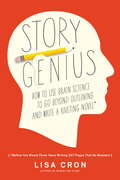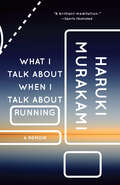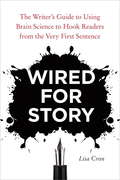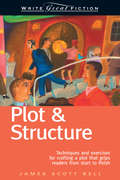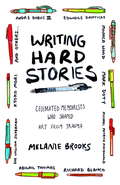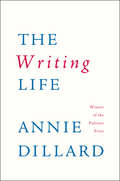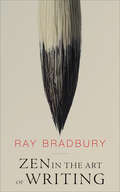Special Collections
NaNoWriMo
Description: Are you participating in National Novel Writing Month (NaNoWriMo)? If so, get started with some craft books on writing and revising! #writing #writer #nanowrimo #nationalnovelwritingmonth
- Table View
- List View
Story Genius
by Lisa CronFollowing on the heels of Lisa Cron's breakout first book, Wired for Story, this writing guide reveals how to use cognitive storytelling strategies to build a scene-by-scene blueprint for a riveting story. It's every novelist's greatest fear: pouring their blood, sweat, and tears into writing hundreds of pages only to realize that their story has no sense of urgency, no internal logic, and so is a page one rewrite. The prevailing wisdom in the writing community is that there are just two ways around this problem: pantsing (winging it) and plotting (focusing on the external plot). Story coach Lisa Cron has spent her career discovering why these these methods don't work and coming up with a powerful alternative, based on the science behind what our brains are wired to crave in every story we read (and it's not what you think). In Story Genuis Cron takes you, step-by-step, through the creation of a novel from the first glimmer of an idea, to a complete multilayered blueprint--including fully realized scenes--that evolves into a first draft with the authority, richness, and command of a riveting sixth or seventh draft.From the Trade Paperback edition.
What I Talk About When I Talk About Running
by Haruki MurakamiAn intimate look at writing, running, and the incredible way they intersect, What I Talk About When I Talk About Running is an illuminating glimpse into the solitary passions of one of our greatest artists.While training for the New York City Marathon, Haruki Murakami decided to keep a journal of his progress. The result is a memoir about his intertwined obsessions with running and writing, full of vivid recollections and insights, including the eureka moment when he decided to become a writer. By turns funny and sobering, playful and philosophical, here is a rich and revelatory work that elevates the human need for motion to an art form.
Wired for Story
by Lisa CronThis guide reveals how writers can utilize cognitive storytelling strategies to craft stories that ignite readers' brains and captivate them through each plot element. Imagine knowing what the brain craves from every tale it encounters, what fuels the success of any great story, and what keeps readers transfixed. Wired for Story reveals these cognitive secrets--and it's a game-changer for anyone who has ever set pen to paper. The vast majority of writing advice focuses on "writing well" as if it were the same as telling a great story. This is exactly where many aspiring writers fail--they strive for beautiful metaphors, authentic dialogue, and interesting characters, losing sight of the one thing that every engaging story must do: ignite the brain's hardwired desire to learn what happens next. When writers tap into the evolutionary purpose of story and electrify our curiosity, it triggers a delicious dopamine rush that tells us to pay attention. Without it, even the most perfect prose won't hold anyone's interest. Backed by recent breakthroughs in neuroscience as well as examples from novels, screenplays, and short stories, Wired for Story offers a revolutionary look at story as the brain experiences it. Each chapter zeroes in on an aspect of the brain, its corresponding revelation about story, and the way to apply it to your storytelling right now.
Write Great Fiction
by James Scott BellTechniques and exercises for crafting a plot that grips readers from start to finish.
Writing Hard Stories
by Melanie BrooksAcclaimed memoirists describe the process of writing their most painful memoriesWriting Hard Stories encourages all writers as they work to craft honest memoirs. Some of the country’s most admired authors describe their own treks through dark memories and breakthrough moments and attest to the healing power of putting words to experience.“Why we endeavor collectively to write a book or paint a canvas or write a symphony...is to understand who we are as human beings, and it’s that shared knowledge that somehow helps us to survive.”—Richard Blanco“Here’s what you need to understand: your brothers [or family or friends] are going to have their own stories to tell. You don’t have to tell the family story. You have to tell your story of being in that family.”—Andre Dubus III“We all need a way to express or make something out of experiences that otherwise have no meaning. If what you want is clarity and meaning, you have to break the secrets over your knee and make something of those ingredients.”—Abigail Thomas“What we remember and how we remember it really tells us how we became who we became.”—Michael Patrick MacDonald“The reason I write memoir is to be able to see the experience itself...I hardly know what I think until I write...Writing is a way to organize your life, give it a frame, give it a structure, so that you can really see what it was that happened.”—Sue William Silverman“After a while in the process, you have some distance and you start thinking of it as a story, not as your story...It was a personal grief, but no longer personal...[It’s] something that has not just happened to me and my family, but something that’s happened in the world.”—Edwidge Danticat“Tibetan Buddhists believe that eloquence is the telling of a truth in such a way that it eases suffering...The more suffering that is eased by your telling of the truth, the more eloquent you are. That’s all you can really hope for—being eloquent in that fashion. All you have to do is respond to your story honestly, and that’s the ideal.”—Kate Bornstein“You can never entirely redeem the experience. You can’t make it not hurt anymore. But you can make it beautiful enough so that there’s something to balance it in the other scale. And if you understand that word beautiful as not necessarily pretty, then you’re getting close to recognizing the integrative power of restoring the balance, which is restoring the truth.”—Richard Hoffman
The Writing Life
by Annie DillardAnnie Dillard has written eleven books, including the memoir of her parents, An American Childhood; the Northwest pioneer epic The Living; and the nonfiction narrative Pilgrim at Tinker Creek. A gregarious recluse, she is a member of the American Academy of Arts and Letters.
Zen in the Art of Writing
by Ray BradburyThe celebrated author of Fahrenheit 451 and The Martian Chronicles offers inspiration and insight on finding one&’s muse and channeling it onto the page. Acclaimed writer of novels and short stories as well as screen- and stage plays, Ray Bradbury has established himself as one of the most legendary voices in science fiction and fantasy. In Zen in the Art of Writing, he shares how his unbridled passion for creating worlds made him a master of the craft. Part memoir, part philosophical guide, the essays in this book teach the joy of writing. Rather than focusing on the mechanics of putting words together, Bradbury&’s zen is found in the celebration of storytelling that drove him to write every day. Bringing together eleven essays and a series of poems written with his own unique style and fervor, Zen in the Art of Writing is a must read for all prospective writers and Bradbury fans. &“Bradbury lovers will find this a Bradbury feast.&” —Kirkus Reviews
